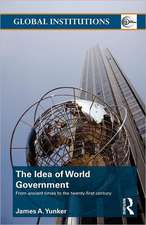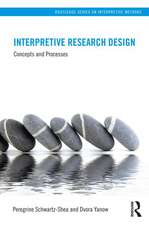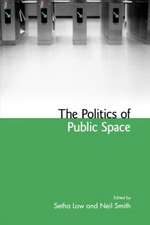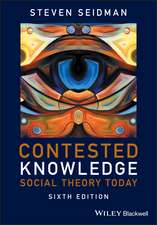Freedom and Its Conditions: Discipline, Autonomy, and Resistance
Autor Richard Flathmanen Limba Engleză Hardback – 30 apr 2003
| Toate formatele și edițiile | Preț | Express |
|---|---|---|
| Paperback (1) | 195.36 lei 6-8 săpt. | |
| Taylor & Francis – 30 apr 2003 | 195.36 lei 6-8 săpt. | |
| Hardback (1) | 323.19 lei 6-8 săpt. | |
| Taylor & Francis – 30 apr 2003 | 323.19 lei 6-8 săpt. |
Preț: 323.19 lei
Nou
Puncte Express: 485
Preț estimativ în valută:
61.84€ • 64.74$ • 51.17£
61.84€ • 64.74$ • 51.17£
Carte tipărită la comandă
Livrare economică 05-19 aprilie
Preluare comenzi: 021 569.72.76
Specificații
ISBN-13: 9780415945615
ISBN-10: 0415945615
Pagini: 224
Dimensiuni: 152 x 229 x 19 mm
Greutate: 0.46 kg
Ediția:New.
Editura: Taylor & Francis
Colecția Routledge
Locul publicării:Oxford, United Kingdom
ISBN-10: 0415945615
Pagini: 224
Dimensiuni: 152 x 229 x 19 mm
Greutate: 0.46 kg
Ediția:New.
Editura: Taylor & Francis
Colecția Routledge
Locul publicării:Oxford, United Kingdom
Recenzii
"A major strength of Richard Flathman's work as a theorist has been his ability to draw fresh and surprising insights from an unusual selection of philosophical sources (notably Hobbes, Wittgenstein, and Oakeshott in earlier works, and more recently, Montaigne, Nietzsche, and Foucault), and to make them relevant to his own very novel rearticulation of the liberal-individualist vision of life. Flathman does this again in his latest work, taking up Foucault's preoccupation with notions of discipline and resistance, and presenting a subtle and intriguing meditation on how these themes relate to freedom. As always, his readers have the good fortune to be driven back to fundamental questions of political philosophy." -- - Ronald Beiner, author of Philosophy in a Time of Lost Spirit: Essays on Contemporary Theory
"In this brilliant study, Richard Flathman takes aim at one of the most widely shared commonplaces of the modern world: namely, freedom begins only where discipline - the exercise of constructive power over oneself and others - ends. He argues persuasively that there is a much more complex field of relations between the exercise of discipline and the enabling of freedom, including the freedom to resist forms of discipline. This acute study is a major contribution to the growing literature on 'agonistic' freedom and on reconceiving freedom today." -- James Tully, author of Strange Multiplicity: Constitutionalism in an Age of Diversity
"Once again, Richard Flathman has written a smart, compelling book about a central concept in political philosophy. Even when I don't agree with his argument, I always find myself admiring it." -- Nancy Hirschmann, author of The Subject of Liberty: Toward a Feminist Theory of Freedom
"In this brilliant study, Richard Flathman takes aim at one of the most widely shared commonplaces of the modern world: namely, freedom begins only where discipline - the exercise of constructive power over oneself and others - ends. He argues persuasively that there is a much more complex field of relations between the exercise of discipline and the enabling of freedom, including the freedom to resist forms of discipline. This acute study is a major contribution to the growing literature on 'agonistic' freedom and on reconceiving freedom today." -- James Tully, author of Strange Multiplicity: Constitutionalism in an Age of Diversity
"Once again, Richard Flathman has written a smart, compelling book about a central concept in political philosophy. Even when I don't agree with his argument, I always find myself admiring it." -- Nancy Hirschmann, author of The Subject of Liberty: Toward a Feminist Theory of Freedom
Cuprins
1. Introduction 2. Discipline, Freedom and Resistance: Preliminary Reflections by way of an Engagement with Foucault 3. The Self Against and for Itself: I: Montaigne on Freedom, Discipline and Resistance 4. The Self Against and for Itself: II: Nietzsche as Theorist of Disciplined Freedom of Action and Free-Spiritedness 5. Stuart Hampshire on Freedoms and Unfreedoms of Mind and of Action 6. Stuart Hampshire on Freedoms and Unfreedoms of Action: Discipline, Freedom, and Resistance Conclusion




















